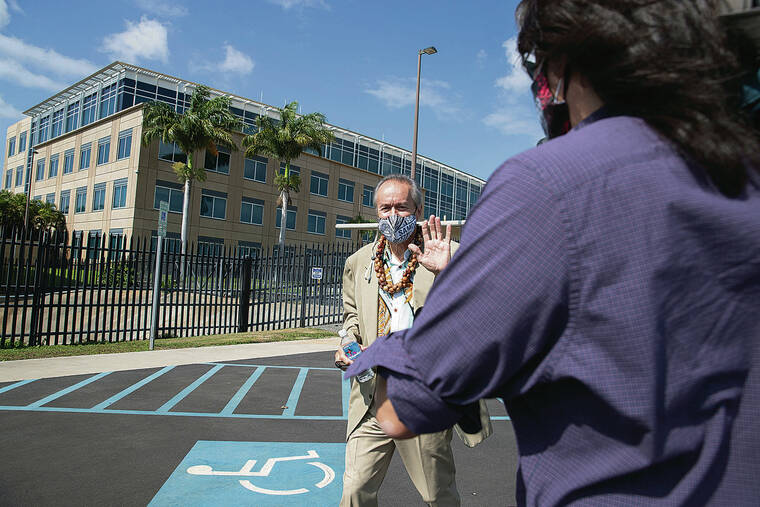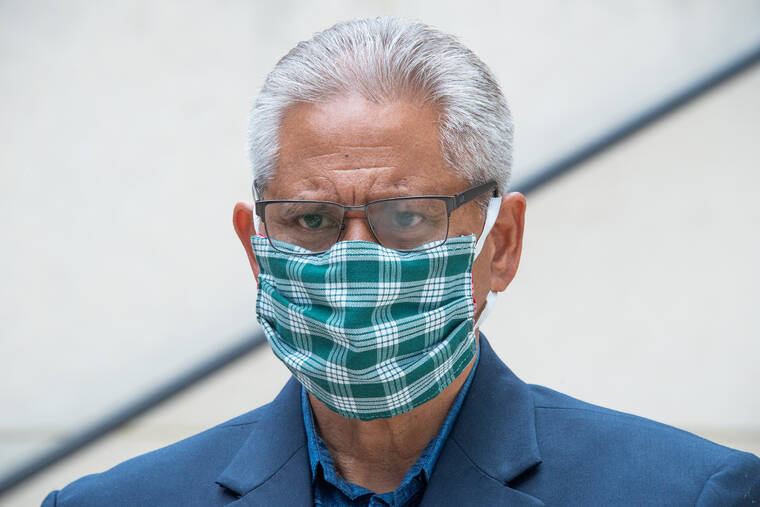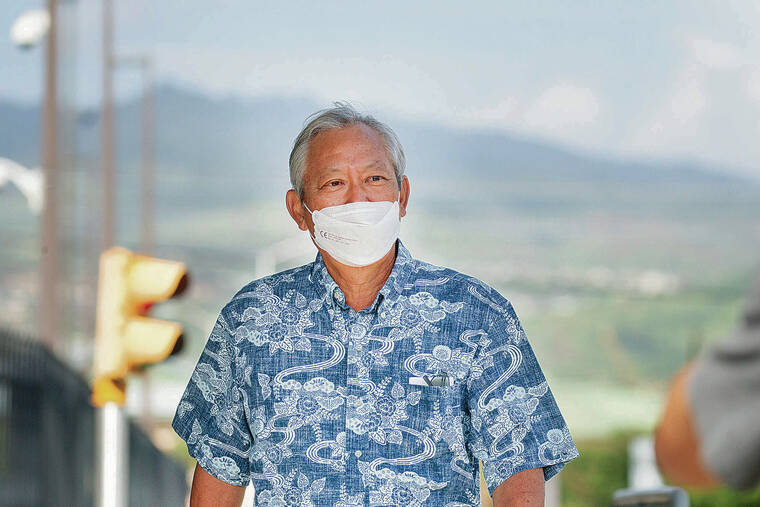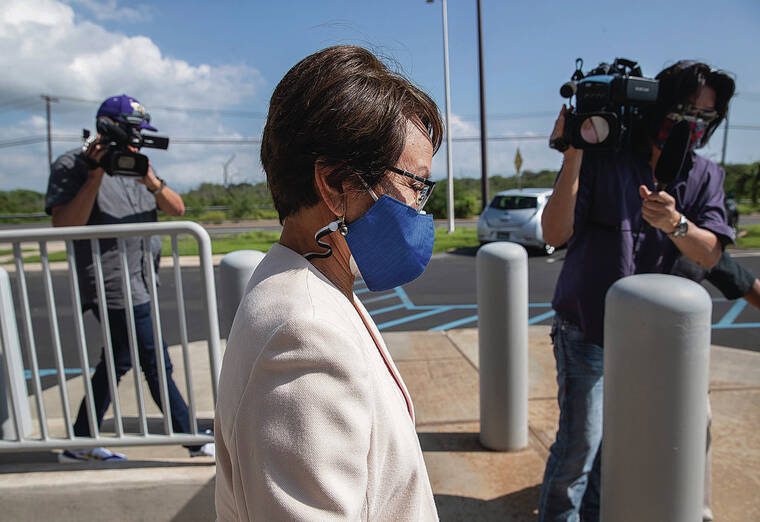Indictment of former city officials sparks more questions about federal probe


CINDY ELLEN RUSSELL / CRUSSELL@STARADVERTISER.COM
Former Honolulu Police Commission Chairman Max Sword turned himself in to the FBI on Wednesday morning in Kapolei in connection with an ongoing federal investigation. All three entered pleas of not guilty and each was released on an unsecured $50,000 bond.

STAR-ADVERTISER
Former Honolulu police Chief Louis Kealoha was sentenced to seven years in prison for conspiracy, fraud and obstruction of justice in December 2020.

CINDY ELLEN RUSSELL / CRUSSELL@STARADVERTISER.COM
Former city Managing Director Roy Amemiya, turned himself in to the FBI on Wednesday morning in Kapolei in connection with an ongoing federal investigation. All three entered pleas of not guilty and each was released on an unsecured $50,000 bond.

CINDY ELLEN RUSSELL / CRUSSELL@STARADVERTISER.COM
Former Corporation Counsel Donna Leong turned herself in to the FBI on Wednesday morning in Kapolei in connection with an ongoing federal investigation. All three entered pleas of not guilty and each was released on an unsecured $50,000 bond.





The indictment of three former top city officials who allegedly conspired to divert $250,000 in government funds in a retirement settlement with former police Chief Louis Kealoha and conceal the transaction from scrutiny has raised questions about how the settlement was orchestrated.
Former city Managing Director Roy Amemiya, former Corporation Counsel Donna Leong and former Honolulu Police Commission Chairman Max Sword turned themselves in to the FBI at about 6:30 a.m. Wednesday at the bureau’s Kapolei office. Their attorneys were informed late Tuesday night that the trio would be arrested in connection with a public corruption investigation that dates to at least 2017.
The Honolulu Police Commission in January 2017 approved a $250,000 payment to the then-indicted chief to leave under a “retirement agreement.” The settlement and Kealoha’s departure came after a seven-year term overshadowed by allegations of police misconduct and wrongdoing. Kealoha was sentenced to seven years in prison and his estranged wife, former Deputy Prosecuting Attorney Katherine Kealoha, received 13 years in December 2020, after being convicted of conspiracy, fraud and obstruction of justice in a probe that started with a report that Kealoha’s mailbox was stolen. In addition to the Kealohas, two former HPD officers were also convicted.
In the wake of the case, a number of former and current government officials have come under U.S. Department of Justice scrutiny. Amemiya, who served as the city’s managing director under former Mayor Kirk Caldwell, received a federal target letter in June.
He is the highest official in city government under the Caldwell administration to be named as a target of the federal investigation. Leong was put on paid leave in January 2019 after receiving a target letter.
Caldwell has previously told the Honolulu Star-Advertiser that he has not received a target letter.
Don't miss out on what's happening!
Stay in touch with breaking news, as it happens, conveniently in your email inbox. It's FREE!
In response to a request for comment, Caldwell’s attorney, Lex Smith, said in a statement, “Ms. Leong, Mr. Sword and Mr. Amemiya have significant experience in public service and the private sector. The city hired them based on that experience. It is important to remember Ms. Leong, Mr. Sword and Mr. Amemiya are innocent unless and until proven guilty, and I will be interested in the coming days and weeks to understand the charges that have been brought against them.”
The unsealing of the indictment and the arrests of Amemiya, Leong and Sword, each of whom has a resume reflecting decades of high-profile public, community service and private business experience, was unprecedented, according to veteran attorneys.
Assistant U.S. Attorney Michael G. Wheat, who has prosecuted inter-district conflict cases in Hawaii and Arizona since 2012, did not return a request for comment about the charges, and a spokesperson for the U.S. Attorney’s Office declined comment.
“The question really is, ‘Where is this going?’” said Ken Lawson, a faculty specialist at the University of Hawaii’s William S. Richardson School of Law and co-director of the Hawaii Innocence Project. “I sat through the Kealoha trial. Knowing Michael Wheat, there is no way he would bring these charges unless he thought he could prove it. He is very, very thorough. The question has to be asked, who is the one who put this in motion? Who gave the order ‘we need to settle with the chief of police in a way that the council can’t get at it.’”
Megan Kau, a former deputy prosecutor who now works as a private defense attorney and litigator, said she was perplexed by the indictments.
“I’ve never seen anything like this before,” she said. “All I see is a lack of evidence against Kirk Caldwell and the government doing what they always do … going after the people underneath who they actually want. All three turned themselves in and actually got arrested. This tells us very loud and clear that these three didn’t cooperate, they didn’t give any information (to the U.S. Department of Justice) and Kirk Caldwell isn’t going to be investigated.”
Leong, Sword and Amemiya each entered pleas of not guilty through their attorneys before U.S. District Judge Rom Trader. Each was released on an unsecured $50,000 bond. Their trial is scheduled for 9 a.m. March 14.
According to an indictment filed Dec. 16 and unsealed Wednesday morning, the trio conspired to “embezzle, steal, obtain by fraud and otherwise without authority” money from a city program receiving federal funding and conceal the source of the funds from the Honolulu City Council and the public.
The three allegedly “did induce HPD” to pay part of Kealoha’s settlement with city money meant for vacant funded positions and then made “materially false and misleading representations and omissions” to the City Council to get money to obtain a reallocation of city funds to cover the Kealoha payment, according to the indictment.
They allegedly persuaded HPD not to tell the Council that the department’s request for additional 2017 fourth-quarter funds was caused by a “salary shortfall” caused by the payout to Kealoha in the third quarter.
“Our police department is incredibly understaffed and there are not enough patrol officers now to try and keep our neighborhoods safe,” State of Hawaii Organization of Police Officers president Robert “Bobby” Cavaco said in a statement. “For these accused felons to have taken money budgeted to hire more police officers and use it to pay off a failed former police chief is sickening.”
The City Council sent a letter to Sword asking if the payment was going to be presented to the full Council for a vote and requesting a briefing before the Police Commission voted to approve Kealoha’s settlement. Sword replied in writing that the settlement “was primarily based on Kealoha’s employment and retirement concerns and did not solely or primarily concern the use of city funds.”
He then met with HPD leadership Jan. 13, 2017, who told him they could not afford the payment without cutting services and pressed him about why they needed to cut the check.
“Oh the reason it’s very simple,” Sword allegedly said, according to the indictment. “So you don’t have to go to the seven bananas, I mean nine bananas up at the Council.”
Later that day, Sword allegedly participated in a call with Leong, HPD acting Chief Cary Okimoto, and the city budget and fiscal services director. Leong allegedly told the parties the money would come out of HPD’s salary fund and replaced later.
A Jan. 24, 2017, letter sent by Okimoto to the administration and commission repeating their position that the department could not cover the settlement made its way into media reports. Sword allegedly asked Okimoto to call the press and clarify his comments but the chief refused.
Amemiya allegedly told the acting chief he was “burning bridges” by objecting to pay the settlement out of HPD’s accounts. On Feb. 1, 2017, Sword allegedly warned Okimoto about his public statements and told him he was going to tell the media the settlement was paid and they were moving on to looking for a new chief.
Amemiya’s attorney, Lyle Hosoda, told the Star-Advertiser that Amemiya is “frustrated and disappointed” that DOJ pursued charges that he called false and baseless.
“The indictment itself shows that Mr. Amemiya was not involved in the decision regarding Chief Kealoha’s disassociation and severance from HPD. Mr. Amemiya learned of this action at the same time the public learned through the news media,” said Hosoda. “It has been Mr. Amemiya’s honor and privilege to serve the people of Honolulu as the city’s managing director. While he has always believed and trusted in the justice system, this situation is difficult to comprehend.”
Sword’s attorney, William C. McCorriston, said in a statement that Sword is both “shocked and disappointed” by the indictment because he cooperated with the Justice Department.
“His only alleged ‘misconduct’ was following the legal advice given to him by the Corporation Counsel’s office and the recommendations of the administration, including the Department of Budget and Fiscal Services, which recommended the structure of the settlement,” said McCorriston in a statement. “Interested parties, including City Council members, the Honolulu Police Department, and the public were allowed to give their input in a public hearing on this matter. The Corporation Counsel’s advice to the Honolulu Police Commission, including Mr. Sword, confirmed its recommendation for the settlement structure and its appropriateness for this case after hearing objections from the Honolulu Police Department and others. … We will vigorously defend Mr. Sword from this unjust charge.”
Leong’s attorney, Lynn Panagakos, said in addition to being entirely legal, the severance payment was in the best interest of the city as it quickly ended Kealoha’s tenure after his receipt of a DOJ target letter.
“It is beyond ironic that the same attorneys that prosecuted the Kealohas for corruption, are now accusing Donna Leong for legal actions she took in relation to the Honolulu Police Commission’s decision to expeditiously separate former chief Kealoha from HPD, for the benefit of HPD and the community,” Panagakos said in a written statement. “To suggest that a legal severance payment that accomplished this goal was somehow a crime is absurd. Ms. Leong is an attorney of great integrity, and is completely innocent. After being informed last night that an arrest warrant had issued, Ms. Leong made arrangements to voluntarily turn herself in this morning. Upon arrival to the FBI’s office, we let them know she was waiting outside. There was absolutely no reason for the theatrics which followed. Whoever tipped off the media so that Ms. Leong could be filmed while being handcuffed should be ashamed of themselves.”
Justice Department officials declined to comment on Panagakos’, McCorriston’s and Hosoda’s assertions.
“The city is troubled and saddened to learn of the indictment unsealed today charging former city officials Leong, Amemiya and Sword,” said Honolulu Mayor Rick Blangiardi, in a statement to the Star-Advertiser. “The administration recognizes the indictment contains allegations, not facts, and will monitor the matter closely. We are committed to ending public corruption and restoring faith in government.”



